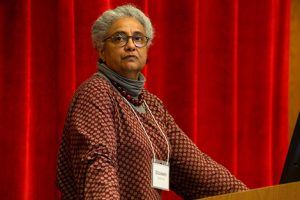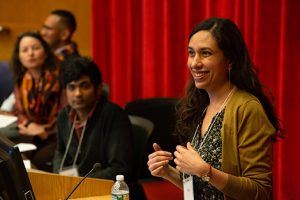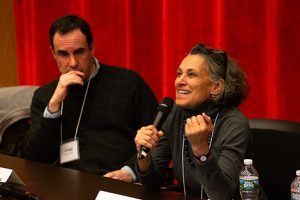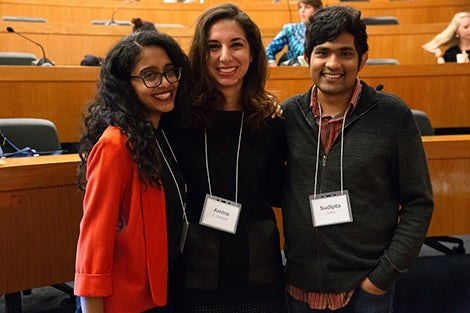February 19, 2019—Speakers at a conference organized by students at Harvard T.H. Chan School of Public Health questioned the ways that global health is taught and practiced, from the scholars studied in classes to the agendas set by mega-funders like Bill Gates. They urged the packed audience of students and researchers to consider the ways that unequal power relationships between the global north and south affect the health of formerly colonized people, and to work toward a “decolonized” global health field.
Decolonizing Global Health was held February 8, 2019 in Kresge G1. It was co-chaired by Amina Goheer, Purvaja Kavattur, and Sudipta Saha, master of science candidates in the Department of Global Health and Population.
The conference framed current practices in global health within a historical context. Once known as “tropical health,” the field has roots in European colonial endeavors, for example, hospitals set up to treat plantation workers and “civilizing” cleanliness campaigns. Today, despite practitioners’ genuine desire to do good in the world, the field still reflects its historical baggage, as well as current unequal economic interests and power structures, conference organizers said.

In opening remarks, Elizabeth Solomon, assistant director of academic affairs and fellowship programs in the Department of Social and Behavioral Sciences and a member of the Massachusetts Tribe at Ponkapoag, reminded audience members that they were meeting on colonized Native space. The systems that resulted in colonization are still in place, she said, and can be seen in the U.S. in practices such as overbuilding and gentrification.

During the opening plenary, panelists suggested that students “decenter” themselves when pursuing global health. Rather than thinking of themselves as saviors to those in need, they could instead find ways to support local efforts that are already in place. Also, they should keep asking questions about who benefits from their research, said Priya Lal, an associate professor at Boston College whose research focuses on development in postcolonial Tanzania. Anne-Emmanuelle Birn, a professor at the University of Toronto’s Dalla Lana School of Public Health, told the audience: “Never be comfortable.”

Mary Bassett, director of the FXB Center for Health and Human Rights and FXB Professor of the Practice of Human Rights, joined Yale School of Public Health’s Gregg Gonsalves, a former AIDS activist and current MacArthur Fellow, for a closing plenary focused on advocacy. She urged students to approach public health work in solidarity with excluded and marginalized people—whether they live in a faraway country or in the School’s back yard in Roxbury. Gonsalves spoke about the importance of local knowledge and social activism in a field dominated by international experts and nongovernmental organizations.
“It’s time for us to act up again,” he said.
Photos: Sarah Sholes
